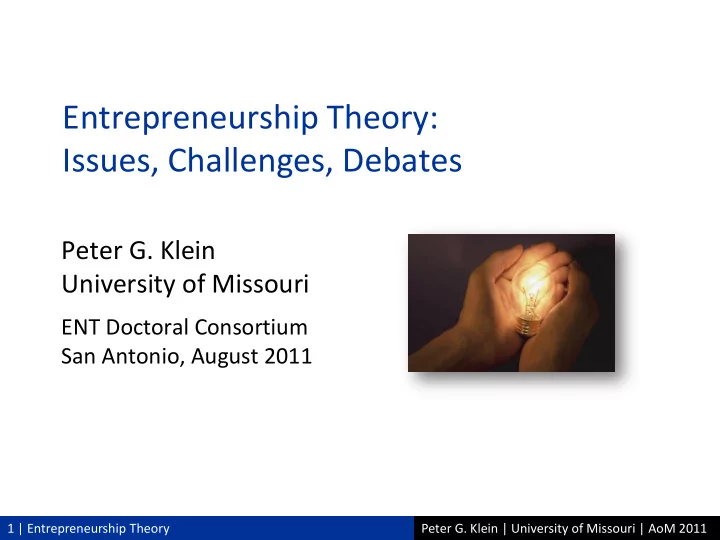

Entrepreneurship Theory: Issues, Challenges, Debates Peter G. Klein University of Missouri ENT Doctoral Consortium San Antonio, August 2011 1 | Entrepreneurship Theory Peter G. Klein | University of Missouri | AoM 2011
Theorizing about entrepreneurship ► General issues and problems ► Some important theoretical contributions ► Relationship between theory and applied work ► Caveats 2 | Entrepreneurship Theory Peter G. Klein | University of Missouri | AoM 2011
Issue #1: What exactly is entrepreneurship? ► A phenomenon Self employment Startups Small-business management New-product introduction Analytical tools: “standard” economics, sociology, psychology, history ► A way of acting Creativity, imagination, initiative Innovativeness Alertness to profit opportunities Judgment under uncertainty Analytical tools: “alternative” economics, sociology, psychology, history ► My secret desire: drop the e-word 3 | Entrepreneurship Theory Peter G. Klein | University of Missouri | AoM 2011
Issue #2: “Theory” – varies by academic discipline ► Neoclassical economics Labor-economics literature on occupational choice Economics of innovation and technology Economics of networks ► Heterodox economics Behavioral economics models of biases and heuristics Austrian perspectives on discovery and judgment ► Sociology ► Multidisciplinary approaches Social network theory Entrepreneurial orientation Identity Effectuation ► Psychology Strategic entrepreneurship Entrepreneurial cognition literature ► History, rhetoric Positioning issues? ► Others? 4 | Entrepreneurship Theory Peter G. Klein | University of Missouri | AoM 2011
Issue #3: Metholodogy ► The unit of analysis Individuals? Teams? Firms? Industries, economies, societies? Opportunities? Investments? Figure 1 : A General Model of Social Science Explanation Behaviors? ” Social 4 Social facts ” (e.g., outcomes ► Methodological institutions) ” macro ” individualism 1 3 ► Causation ► Theory and practice ” micro ” Conditions Individual of individual action 2 action 5 | Entrepreneurship Theory Peter G. Klein | University of Missouri | AoM 2011
Some important theoretical contributions ► Schumpeter (1911): introducing exogenous change to Walrasian equilibrium ► Knight (1921): decomposing interest, wages, and profit; risk versus uncertainty ► Kirzner (1973): using alertness to explain market equilibration (Note on instrumentalism) ► Kihlstrom and Laffont (1979): self- employment and risk aversion ► Baumol (1990): productive, unproductive, and destructive entrepreneurship ► Lumpkin and Dess (1996): entrepreneurial orientation ► Garud and Karnoe (2003): bricolage versus breakthrough ► Lazear (2004, 2005): balanced skills ► Alvarez and Barney (2007): discovery versus creation 6 | Entrepreneurship Theory Peter G. Klein | University of Missouri | AoM 2011
Soapbox comments ► There is no “entrepreneurship theory.” ► Many theory papers try to do too much (the kitchen-sink model). ► We have few established criteria for choosing among rival theories. ► Good research can be phenomenon driven, not theory driven. 7 | Entrepreneurship Theory Peter G. Klein | University of Missouri | AoM 2011
Recommend
More recommend